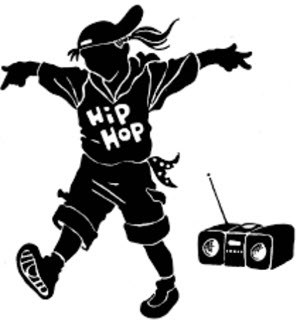Become a Patreon!
Abstract
Excerpted From: Christopher Doval, Don Anque, and Angela Lohman, Hip-Hop and Other Professor's Pedagogy, 2 Arizona State Sports & Entertainment Law Journal 73 (December, 2012) (51 Footnotes) (Full Document)
 Hip-hop has been the music of a community oppressed by racism, poverty, over-incarceration, and police brutality. Through a culture of DJs, graffiti, break dancing and rap, in the late 1970s and early 1980s, this community created a voice of its own: a voice that has directly affected America through television, film, fashion, visual arts, and dance. This paper emphasizes the need to take advantage of hip-hop culture and its pervasiveness in our modern society to harness its unifying nature among our students and to better drive their ability to relate with educational lessons.
Hip-hop has been the music of a community oppressed by racism, poverty, over-incarceration, and police brutality. Through a culture of DJs, graffiti, break dancing and rap, in the late 1970s and early 1980s, this community created a voice of its own: a voice that has directly affected America through television, film, fashion, visual arts, and dance. This paper emphasizes the need to take advantage of hip-hop culture and its pervasiveness in our modern society to harness its unifying nature among our students and to better drive their ability to relate with educational lessons.
During the 1990s, hip-hop culture was introduced into the curriculum of many primary and secondary schools throughout the United States, ultimately resulting in higher retention rates and student achievement. Beyond the small amount of work produced by a handful of academics, often in the field of African-American studies, hardly any literature exists depicting how and with what tools one might bring hip-hop culture and media into a university setting.
This paper will show that hip-hop culture can be a teaching vehicle, particularly for legal studies, and provide professors a resource through which they can better engage and interact with their students. In the eyes of many, modern mainstream hip-hop has been typecast as fraught with violence, misogyny and materialism. This paper will show that hip-hop culture, included within a legal studies curriculum, can move beyond the obvious applications in criminal and tort law and into the broader scheme of legal studies. Particularly, the intersection where hip-hop convenes with big business provides the educator with countless opportunities to reveal dynamic American cultural views on ethics, social consciousness, and the law in a manner that supports discussion and reflection amongst Millennials.
Hip hop means the whole culture of the movement ... when you talk about rap .... Rap is part of the hip hop culture .... The emceeing .... The djaying is part of the hip hop culture. The dressing the languages are all part of the hip hop culture. The break dancing the b-boys, b-girls ... how you act, walk, look, talk are all part of hip hop culture ... and the music is colorless. Hip Hop music is made from Black, brown, yellow, red, white ... whatever music that gives you that grunt ... that funk, that groove or that beat .... It's all part of hip hop. Bambaataa
[. . .]
Since its inception thirty years ago, hip-hop has changed the world. Through media access and technology, hip-hop has touched generations well beyond U.S. borders. In an ever-diversifying world, educator's need new tools to engage and retain students. Using hip-hop as a vehicle for content, particularly legal studies, allows education to be accessible and of interest. If the new traditional student cannot experience a world without hip-hop, how can we, as educators, not as well?
Christopher Doval, J.D., Syracuse University College of Law, 2010; M.S., Syracuse University, 2010; B.A., Virginia Commonwealth University, 2006. Assistant Professor of Management and Marketing, Virginia State University.
Don Anque, J.D., Syracuse University College of Law, 2011, B.A., University of California Riverside, 2007.
Angela Lohman J.D., Syracuse University College of Law, 2009, B.A., Messiah College, 2006. Program Specialist at FEMA.
Become a Patreon!


